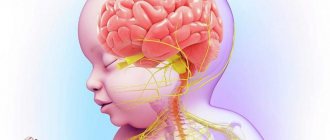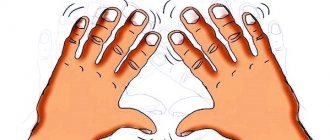Hysteria is a mental disorder that manifests itself in the form of a variety of functional, autonomic, motor, sensory and affective disorders. Hysteria is characterized by great self-hypnosis and the desire to attract the attention of others. The individual is able to attach symbolic and psychological value to these violations.
Hysteria refers to an outdated medical diagnosis that corresponds to a range of mental disorders of moderate to mild severity. This disease often develops in individuals with neurotic character traits. Previously, this term was used for a long time in describing specific disorders of behavior and well-being in women.
Symptoms
Hysteria manifests itself in people during moments of emotional stress, nervous shock, general mental fatigue, as well as other traumatic situations. The characteristic features of this disorder are:
- a penchant for dramatization and theatricality;
- hyper-emotionality;
- attracting attention to oneself (this also includes extreme preoccupation with appearance), which is associated with easy suggestibility from the environment.
Hysterics are extremely dependent on others, for the sake of whose attention they are ready to even the most eccentric actions. Their thinking is built around their Ego, which is unstable. Hence the vulnerability, the constant desire to be recognized by someone. Hysterics have learned to use their weaknesses to their advantage: for example, theatricality allows them to manipulate people.
Hysterical attacks begin with hysterical paroxysm, which follows an unpleasant experience, a quarrel, or indifference on the part of loved ones. A seizure begins with the corresponding symptoms:
- Crying, laughing, screaming
- Pain in the heart area
- Tachycardia (rapid heartbeat)
- Feeling short of air
- Hysterical ball (feeling of a lump rolling up to the throat)
- The patient falls, convulsions may occur
- Hyperemia of the skin of the face, neck, chest
- Eyes are closed (when trying to open, the patient closes them again)
- Sometimes patients tear their clothes, hair, and hit their heads
Hysteria is diagnosed by doctors if at least three signs are present:
- Labile and superficial emotionality.
- Self-dramatism, exaggeration of the situation.
- Inappropriate seductiveness.
- Preoccupation with external attractiveness.
- Suggestibility and susceptibility to the influence of others.
- Excitement, desire to be recognized and to be the center of attention.
- Tendency to be touchy.
- Egocentrism.
- Pretense.
- The desire to manipulate others to satisfy personal desires.
- Shallow and superficial emotions.
- Provocative behavior.
- Variability of speech.
Attacks of involuntary crying: causes, methods of diagnosis and treatment
Attacks of involuntary crying are a pathological condition that signals organic brain damage, diseases of the nervous system and other disorders. If tears appear during sleep, this may be a symptom of Alzheimer's disease.
Symptoms of involuntary crying
Involuntary crying may be accompanied by the following symptoms:
- pain in different parts of the body;
- fainting;
- nausea and vomiting;
- general weakness;
- trembling of limbs;
- spasms;
- attacks of irritation;
- emotional instability;
- temporary immobility;
- inability to move independently;
- sensory disturbances;
- dizziness;
- headache.
Causes of involuntary crying
Uncontrollable crying attacks occur due to the following reasons:
Affective-respiratory paroxysm can cause 2 types of attacks - pale and blue. Pale attacks appear in newborns with severe pain or fear. For some time, patients' pulse completely disappears and their heartbeat is delayed, they lose consciousness.
Subsequently, patients often experience fainting. Blue attacks appear when the child is dissatisfied or angry. He starts screaming, breathing stops when he inhales, then his skin turns blue. Attacks during affective-respiratory paroxysm usually last up to 30 seconds.
They often cause muscle spasms.
Hysterical neurosis is characterized by a strong mental experience that causes disturbances in nervous activity. It may be associated with an intrapersonal conflict or an external factor.
The disease occurs against the background of severe mental trauma or during a prolonged negative situation. With hysterical neurosis, a person experiences a seizure caused by a quarrel and various experiences.
He is worried about pain in the heart area, a lump appears in his throat, his heart rate increases and he is short of breath. The patient falls and tonic convulsions occur. During a seizure, the face becomes pale or red and the eyes are closed.
Often patients begin to tear their clothes, moan or scream, and may laugh or cry. In severe cases, the patient has a sensitivity disorder, often has a headache and the functions of the sensory organs are impaired.
Pseudobulbar syndrome is a neurological disorder that causes uncontrollable bouts of crying or laughing. It develops against the background of existing neurological pathology or brain injury. The patient cannot stop himself for several minutes. He may laugh when he hears sad news or cry in response to minor stimuli.
To identify the cause of uncontrollable crying in a child, the doctor prescribes a comprehensive examination. It includes ultrasound, electroencephalography and electrocardiography of the brain, blood and urine tests. The treatment of disorders is carried out by a neurologist.
If you suspect hysterical neurosis, you should consult a psychotherapist. He conducts a pathopsychological examination and a neurotest, after which he assesses the patient’s condition.
To exclude vascular diseases, the doctor prescribes angiography of the cerebral vessels and ultrasound examination of the vessels of the neck and head.
To diagnose involuntary crying, the network of CMRT clinics uses different methods:
In case of involuntary crying in children over 3 years of age, consultation with a psychologist is necessary. He will adjust parenting methods and offer parents exercises and games that suppress aggression and outbursts of anger. In severe cases, you should make an appointment with a neurologist. He will prescribe medications to eliminate neuropathy and increased excitability.
If crying attacks are caused by hysterical neurosis, then the course of treatment includes antidepressants, sedatives aimed at reducing pain, normalizing sleep and calming the nervous system. For increased excitability, it is effective to take medications based on motherwort and valerian. If the patient has insomnia, then taking sleeping pills is necessary.
Antidepressants will help relieve negative symptoms of pseudobulbar syndrome. Physiotherapy is also indicated to alleviate the patient’s condition. They restore muscle motor functions and improve the functioning of the nervous system. In severe cases, a tube or gastrostomy tube is used to swallow and feed patients.
If pseudobulbar syndrome is caused by hypertension, then antihypertensive and vascular drugs are prescribed. For specific vasculitis, the course of treatment includes antimicrobial drugs and antibiotics. Nootropics, metabolic drugs and anticholinesterase drugs will help improve blood microcirculation in the brain and normalize the functioning of nerve cells.
To treat involuntary crying, the following methods are used in the network of CMRT clinics:
Complications
If left untreated, hysterical neurosis can lead to speech disorders. Patients present with stuttering, chanted speech, or silence.
Complications also include movement disorders, manifested by muscle paresis and paralysis, forced positioning of the limbs.
Patients constantly want to be the center of attention, their mood often changes, they are moody and tearful.
Prevention of involuntary crying
To prevent involuntary crying, the following rules should be followed:
- teach your child to control his emotions;
- do not expose children to long walks or trips, as they lead to overwork;
- avoid haste;
- do not shout at the child;
- do not spoil the child;
- strengthen the nervous system;
- provide a balanced diet.
Diagnostic accuracy and quality service are the main priorities of our work. We value every review our patients leave us.
Panina Valentina Viktorovna
Actress, Honored Artist of the RSFSR
I found out about you on the Internet - I urgently need an MRI.
And after the performance I’m with you. I really liked your staff. Thank you for your attention, kindness and accuracy.
May everything be as good in your soul as I am now, despite all the problems...
Be!!! We're happy! Your Panina V.V.
Open review scan
Array( [ID] => 107 [~ID] => 107 [CODE] => [~CODE] => [XML_ID] => 107 [~XML_ID] => 107 [NAME] => Panina Valentina Viktorovna [~NAME ] => Panina Valentina Viktorovna [TAGS] => [~TAGS] => [SORT] => 100 [~SORT] => 100 [PREVIEW_TEXT] =>
I found out about you on the Internet - I urgently need an MRI.
And after the performance I’m with you. I really liked your staff. Thank you for your attention, kindness and accuracy.
May everything be as good in your soul as I am now, despite all the problems...
Be!!! We're happy! Your Panina V.V.
[~PREVIEW_TEXT] =>
I found out about you on the Internet - I urgently need an MRI.
And after the performance I’m with you. I really liked your staff. Thank you for your attention, kindness and accuracy.
May everything be as good in your soul as I am now, despite all the problems...
Be!!! We're happy! Your Panina V.V.
Source: //cmrt.ru/simptomy/pristupy-neproizvolnogo-placha/
The main causes of hysteria:
- Features of human development. It happens that a child is raised in difficult conditions or is overly spoiled. Then, hearing his parents contradict his desire, he falls into a state of severe hysteria.
- Behavioral features. People with increased emotionality suffer from hysterical attacks. They do not know how to control their emotions, so it is easier for them to yell at someone than to adequately solve the problem.
- Physical overexertion. It happens that a person has overworked, is mentally and physically tired and wants to rest, but others are putting pressure on him. He sleeps little (3–4 hours a day), eats irregularly, eats unhealthy foods, and refuses to exercise. Then he may not be able to stand it, and there will be an outburst of negative emotions.
- Moral exhaustion. Hysteria can be the result of emotional burnout, nervous breakdown, or professional deformation. It often appears in women during PMS or menstrual periods, dieting or lack of self-esteem. The beginning may be a conflict, which soon develops into a serious scandal. Then a person really gives in to emotions and can start crying at one moment and be happy at another.
What kind of people are susceptible to hysteria?
It is quite difficult to say unequivocally which people are more susceptible to hysteria. Hysteria and neuroses, by and large, can happen to anyone, and this depends on a different combination of external and internal factors. However, according to the observations of psychologists and psychiatrists, there is still a certain category of people for whom the risk of such nervous disorders is higher than for others. These are people with increased mental and emotional lability. By and large, this is more of a character trait and a feature of temperament.
People susceptible to hysteria are characterized by the following characteristics:
- rapid and unpredictable changes in mood;
- impressionability;
- abundant and vivid dreams;
- sometimes – a secluded lifestyle;
- challenging behavior or appearance.
There are also quite a large number of external factors that can provoke a nervous disorder. First of all, this is severe stress, problems in life, a number of diseases of the nervous system (sometimes as a consequence of injury), etc.
Types of tears
The appearance of tears is not always associated with the state of the psyche and the experience of any feelings. In medicine there is a term “lacrimation”. This concept refers to the release of tear fluid, which is caused not by emotions, but by other reasons.
In medicine, the following types of tears are distinguished:
- Reflex. Tears are released when smoke or cold wind gets into our eyes. Many of us cry while chopping onions. But this has nothing to do with emotions. In such cases, tears are a reflexive defensive reaction. They are released due to irritation of the mucous membrane of the eye.
- Basal. There are glands inside the eye that constantly secrete tear fluid. This is necessary to protect the organ of vision from drying out. Basal tears contain large amounts of protein, which has bactericidal properties. This protein protects the eye from infection.
- Emotional. The secretion of tear fluid is the body's response to strong experiences. Scientists have studied the composition of emotional tears and found a large amount of stress hormones in them.
When a person cries, he produces emotional tears. This psychophysiological reaction has a positive effect on the body. We will tell you about six beneficial properties of emotional tears.
A week later, the wolf took off the sheep's clothing: how I found a groom in my old age
Let me buy a private island: how very rich people will relax this summer
New scam: racist emails with Trickbot banking trojan
Classification of hysteria
- Everyday
Associated with everyday problems of “nothing to wear” or “I’m bored.” The most monosyllabic, predictable state, and with the correct reaction - short-term and safe.
- Stormy
It’s always a loud complaint: “you stole my best years” or “why don’t I still have a fur coat.” This behavior is explained by the desire to spur an unprincipled, uninitiated, weak-willed partner to take decisive action. And sometimes it really helps to receive a gift without long months of waiting.
- Self-affirming
The woman proudly declares “yes, I’m hysterical,” but implies “I’m a goddess.” He does this not only to test his partner’s patience, but to increase his own importance. So she claims that she does not agree to just sympathy, but deserves great love.
- Silent
The most unpredictable and dangerous. A muffled voice and an insinuating tone do not bode well. After all, it is precisely at such moments that a car is painted, men’s clothes are cut, and sometimes a frying pan flies at your head. If a partner values the relationship, such conditions cannot be ignored under any circumstances.
- Physiological
Often the trigger for female hysteria is chronic fatigue, malnutrition (including during weight loss), and lack of time for oneself. In such cases, a woman needs moral and physical help, as well as free time that she can devote to herself.
- Vengeful
This state is described by the words “nothing happened, everything is fine.” But women's behavior says the opposite - everything is bad. It manifests itself as quiet sobs, uncontrollable moaning or a demonstration of one’s helplessness. In this state, a woman is able to have a lover, cast a love spell from a psychic, or hire a detective to spy on her. It is better for a man to be “on alert” and contact a family psychotherapist.
- Sexy
It is not for nothing that Freud saw the root causes of female hysteria in sexual dissatisfaction. It breaks out in the form of bodily symptoms and inappropriately strong emotional reactions. The best way out for a man is to transfer unspent female energy into the family channel, so that the woman does not look for release on the side.
Uncontrollable bouts of crying or laughing
Yes, I got married more to escape from home, from my mother, because she has the ability to crush everything under herself. If you live in her house, then everything should be as she said, decided, allowed, etc. Mom tried very hard to get into all areas of my life. I really didn’t like this, because I knew that I wouldn’t get a positive assessment of my actions or decisions from her. I never liked the guys with whom I started relationships, they were, in her opinion: too older (the difference was mostly 6-7 years), too cool, influenced me with their authority in my eyes, etc. And how do I Later I realized that this is the type of man to whom I am drawn. At that moment, my husband appeared in my life - the complete opposite: calm, easy-going, courteous, affectionate. My mother was simply delighted with him, and I, of course, was flattered by such attention and care for me on his part, but it was cloying to me. Well, still, my mother constantly reminded me how good he is, how he takes care of me, etc. And when he asked me to marry, I did not immediately agree, just to leave home and gain at least some freedom. I knew that, due to his gentle nature, he would not particularly limit me. But over time, he was no longer satisfied with the fact that he gave himself away, but did not receive the love, care and affection he wanted in return. He began to close himself off, stopped showing any initiative, he is waiting for initiative from me, but I want not to be touched. The relationship is cold on my part, he still tries for me (when I clearly and specifically tell him what I need), he says that he loves me. I see that he transferred all his love and care to his daughter, he sees me in her (even sometimes he says how similar we are). Sometimes I notice that he even somehow perceives her whims or her words to him in a very vulnerable way, and is offended, although he is just a child. I explain to him that she is still small and does not fully understand the meaning of words and her actions - he calms down. There were all kinds of conflicts: his constant disappearances from friends, his reluctance to plan joint vacations or holidays with me, which ultimately led to the fact that we simply stayed at home or celebrated separately. His constant reluctance to take a leading position in his own hands in society, and his constant running to me with the words “go figure it out,” and then accusations against me that I am a “man in a skirt.” In the last 2-3 years, any conflict with him ends in a fight. Either I can’t stand his provocations and get into a fight myself (which I then scold myself very much about, because I understand that the forces are not equal and I simply succumbed to the provocation), or when he doesn’t receive my aggressive reaction, he begins to push and kick in every possible way , insult, put pressure on sore spots - which ultimately leads me to the first, provoked by his actions, I start a fight. He's been talking more about divorce lately, but then he sees that I'm calming down and pretends that nothing happened. I decided for myself that I was waiting for my daughter to become more independent and for my mother to retire - because she is still working and cannot help me with the child, so I am raising funds for separate housing. For now I'll leave everything as is. Then I will make a decision. At work, my mood depends on my manager, because everyone else reports to me and mostly carries out my instructions. It is he who gives the main assessment of my work, because only he sees and can judge the results of my work. Our relationship is strange. When I came to work, I was very flattered by his attention and care. I made mistakes for which I was very worried, but he always defended my point of view. I was not received very well by 2 employees in the team, to which he simply fired them. It started to scare me. He constantly asks my opinion on everything. If there are 2 conflicting proposals from different colleagues, he chooses mine as the ultimate truth. He tells me he appreciates me very much (he also encouraged me financially more than once - he gave me even more than I expected). He and I have formed an excellent working team. But lately he began to find fault with me for any reason. She said it in the wrong tone, answered his call at the wrong second, why did she forget her phone - at home or somewhere? He calls and asks to come in this second, if I say that I have people, I’ll come in 5 minutes - he says that it’s no longer necessary, I’ll write by mail what needs to be done, and then I’ll call. In the morning he calls to make an appointment, and then simply ignores it. If I speak evenly and calmly, he asks if nothing happened, he thinks he is somehow tense; if I smile or laugh, he takes it personally and starts shouting that I take him for a clown. He can throw documents at me, go out and slam the door. He began to swear in front of me, evaluate me - that in his opinion I was strange and he could not understand me. Although I am very pleased with my job, I offered a promotion to deputy - I said that I would think about it, to which I began to freak out and said that I would not think, it was decided and I had 8 minutes to “sort of think and say “yes”. Then he said: “You try, if you fail or change your mind, you can always come back.” I agreed to try, but now he praises my subordinates for the tasks that I manage, but I don’t. And I’m offended, because behind the scenes it was me who managed the whole process, telling everyone how and when and what to do. Together we achieved success. But it turns out that if everything is good, there is no praise. And if there is some mistake (even from my subordinate), he calls me (or calls) and I get the full price for everyone. As he admitted to one of our mutual acquaintances, it was for prevention. So I became kind of nervous in front of him - he makes a remark to me (and he does this by pressing on something very personal, with the words: “what were you listening to when I spoke,” or “maybe you should go and drink some water and calm down, why are you smiling? Accepted something." At first I began to be offended by all these words of his, and then I simply began to translate them into a joke and smile, and this began to infuriate him - he thinks that I am laughing at him like a boy. Well, I get another portion of his anger After which I leave his office and go to the toilet to just cry and get rid of emotional stress. I feel better.
How to quickly stop a tantrum
The most general recommendations could be:
- Help a person come to his senses
When hysterical, a person has difficulty controlling himself, so you need to try to help him “come to his senses” - offer a glass of water, valerian, ask him to calm down.
- Don't persuade
If you begin to persuade a person, calm him down or feel sorry for him, then you will begin to act in the field of his coordinates, where only he will set the direction of communication.
- Leave the premises
If you stay nearby, you will play the role of the audience, for the sake of which the entire “performance” is played out. Therefore, it is better to leave and wait until the attack is over.
- Try to help again
If you believe that the situation is getting out of control, then you can try using very small physical pressure: splashing water on the person, lightly patting the cheeks, lightly pressing on the painful point on the arm just below the elbow pit.
- Talk
After a hysteria, talk to the person, tell him that you cannot cope with such actions (there is no need to generalize to behavior, much less character) and suggest seeking help from a doctor, psychiatrist, psychologist, or psychotherapist.
Tears and human emotions
A child attracts attention by crying.
Scientists who study human behavior note that crying is a reflexive response to external stimuli, demonstrating weakness and vulnerability. This is a request for protection, which manifests itself at the level of instincts laid down even before birth - after all, no one specifically teaches a child to cry. Crying should attract the attention of an adult, first of all, the mother, who, in turn, must find and eliminate the cause of the child’s discomfort. Many children in the first months of life do not know how to cry with tears, they simply make loud sounds.
Diagnostics
The main criterion in diagnosing hysteria is the presence of many serious complaints in the patient in the absence of organic lesions. To exclude other diseases, a thorough laboratory and instrumental examination is carried out.
In the overall structure of the incidence of neuroses, hysteria accounts for approximately 30%.
If necessary, the patient consults an epileptologist, neurosurgeon, neurologist or other specialists.
Manipulation
This kind of crying is sometimes called “crocodile tears.” This is done to make someone feel guilty or sympathize.
One of my friends said that whenever he saw his father grab his belt, he immediately began to cry.
The purpose of such crying is the desire to change the course of the situation in one’s favor.
The husband may not want to visit his in-laws, and the wife may cry to make her husband feel guilty for not loving his in-laws. Or a daughter may make a remark to her mother, and now the woman cries: “You’re saying that to hurt me” or “You don’t love me at all.”
Treatment of hysteria
Constant hysterics in women require mental and medicinal correction. Seizures can last for an excruciatingly long time, tormenting the patient and those around him. It is important to learn how to behave with such a person and stop the breakdown. We need to find out the reasons for a woman’s hysteria.
How to calm your wife down when she's having a seizure:
- The effect of surprise will help best - sprinkle water in the face or make a loud short sound;
- take the woman to a secluded place;
- remove all outsiders;
- give ammonia to sniff, drink water (you can drip valerian or motherwort);
- do not focus on the hysteria, try to stay aloof, but not in the next room;
- do not touch the patient or try to hold her by the head, shoulders, or arms;
- do not leave a woman unattended.
After severe symptoms subside, put the patient to sleep. Persuade him to see a doctor. At the hospital, she will be given an accurate diagnosis and the correct treatment will be selected. Drug therapy involves the use of psychotropic drugs, nootropics and restorative drugs. In psychological practice, autogenic training, suggestion, and correctional therapy are used.
Deep sleep
Many parents notice that after crying, the child sleeps more soundly. This is due to the relaxing and calming effect of emotional tears. In addition, when a baby cries, he spends a lot of energy. After such a release of energy, the child wants to sleep.
A conversation with Einstein about music, which became a lesson for Jerome Weidman
I can’t imagine my sleep without a lavender eye pillow: I make it myself
Having lost 133 kg, Phil managed to defeat the coronavirus and find love
Currently, scientists have not determined whether emotional tears promote sound sleep in adults. However, mature people also notice that crying helps them fall asleep faster after intense experiences. Tears act on them as a kind of sedative and hypnotic.
Physiological causes of seizures in women
- The cause of a seizure due to an excess of estrogen in the blood can be:
- long-term sexual abstinence;
- a certain phase of the menstrual cycle;
- pregnancy;
- menopause;
- chronic alcohol or drug intoxication;
- overstrain of the brain and body, languishing from idleness;
- excess coffee “got to the head” or the consequences of a very specific cranial injury;
- stress both in the family and at work.
The problems are not just yesterday, but have been accumulating for years. And now, finally, they have found a way out in such desperately uncontrollable, often public behavior, which brings colossal relief. A relief that will soon require repeating. This means that a continuation is coming “in the next episode.” Or depression and even a suicide attempt from the realization of what has been done (for not all religions and cultures allow such “unbridled” behavior). And the very movements of a body uncontrolled by the mind can lead to its death, just like during an epileptic seizure.
Why is the ability to cry formed?
In the same way, the cubs of any species of animals and birds cared for by their parents make a shrill noise to attract the attention of their mother. But in young animals the ability to cry with tears is not then developed, but in humans it appears. Why is this happening?
In the process of growing up, a person’s behavior becomes more complex, crying becomes one of the aspects of a person’s group behavior. A child, having matured a little, may cry not because he is cold or thirsty, but because of an insult inflicted by another child. This also becomes a signal of trouble and an insistent request to pay attention to his problem. Crying is followed by an instinctive response from the parents - the reaction to these sounds in the mother, and even in other adults who are not relatives of the baby, is also laid down at the subconscious level. The signal that the baby needs help is recognized instantly.
Interesting: Why are tears and sweat salty?
Symptoms of hysteria in men
Hysteria in men is rare. This is partly explained by the fact that representatives of the stronger half of humanity try not to show their weaknesses in front of strangers. Therefore, the first signs of hysteria in men are usually detected by their wives. Husbands project their condition onto the latter, “venting” their anger.
The main symptom is a condition in which the patient obsessively tries to attract maximum attention to his personality.
Mental disorder in this group of patients develops under the influence of similar factors. An increased tendency to hysterical attacks is observed in men who grew up with frequently quarreling parents. Being formed in such conditions, a person begins to perceive such behavior as the norm.
Both physical (emotional) fatigue and jealousy can provoke a hysterical attack. At the same time, if you do not react to the man’s actions, then his condition will normalize relatively quickly.
Related posts:
- How to treat schizoaffective disorders Schizoaffective disorder (schizoaffective psychosis) is an illness in which there are two interrelated components: ...
- Psycho-oncology Psycho-oncology is the science of psychological, mental, social and ethnic…
- Schizophrenia in adolescents Schizophrenia is a severe mental illness that has a chronic course. She more often...
- Constant fear and anxiety in men All people tend to worry about situations that are out of their control...
Analgesic effect
Emotional tears help reduce pain. Crying acts as a natural analgesic. The analgesic effect is achieved due to the release of endorphins and oxytocin.
For a stylish arch in the garden you only need a couple of old doors: instructions
Sons outdid their fathers in beauty: famous men and their children (photo)
Discover the last few "naturally quiet" places on the planet
Often people are embarrassed to cry, even if tears come. However, research has proven that constantly suppressing crying is very harmful to health. If a person keeps his emotions inside, this can cause pain and psychosomatic pathologies.











